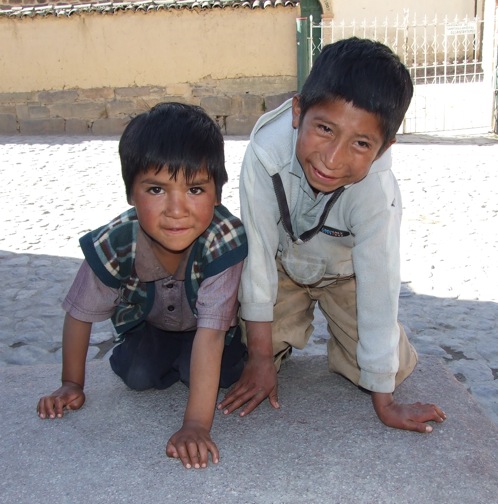
These native village children in Ollantaytambo, Peru are happy and enjoy themselves even though they really don't own anything.
Recently, I was having a conversation with a friend of mine. She was telling me a story about a coworker who was assigned a certain group of troubled people to counsel. Her coworker was having a really tough time because it seemed that none of her counseling books or training had given a real solution to their problem. The problem was that all the clients were depressed – horribly, deeply depressed – yet they all seemed to have fantastic success in their lives: great jobs with high salaries, fancy apartments, new cars, and just about any luxury money could buy. Yet, they were still terribly depressed. Why?
At that point I couldn’t help but notice the contrast. Having just returned to the first world from India and Nepal, I was stunned to see the affluence of the U.S. again… and the misery. You see, in India and Nepal, I was constantly surrounded by people who have virtually nothing. People living in the most abject poverty that it would seem to us Westerners virtually impossible to survive. Yet, these people were happy. They didn’t have much and their lives were tough, but they were happy. How could this be?
While traveling through India, Rabbi Ben and I read the autobiographical novel Holy Cow, one of the most popular books on India. In this book, the author is addressed by a poor man in a village, who tells her that the misery of westerners is because they are always looking at people who have more than them and wishing they could have it (and thus making themselves miserable), while the Indians are always looking at those who have less and are grateful for what they do have. It’s a poignant point and I think that in a lot of ways, he’s right.
In Judaism we have a similar approach to happiness. We don’t advocate judging others, so our approach is not based on looking at what others have or don’t have. Instead, we follow the wise adage of Ben Zoma in Pirkei Avot (Ethics of Our Fathers): “Who is rich? He who is happy with what he has.” We are taught that the key to happiness is to cultivate gratitude for what you do have, rather than to lament over what you do not have.
I’ve recognized in my own life that I tend to be much happier now that I do not “have” as much as I used to. Although other people have plenty of things I do not – a car, a house, a boat, etc. – I find that I am rich in the ways that really do count. I have a loving husband, fantastic friends, constant meaningful life experiences, and plenty of opportunities to improve my middot and grow as a person. The lesson I learned in India is that we do not need any material item but ourselves to be truly happy.
2 Responses to “How to Find Happiness”
Trackbacks/Pingbacks
- It’s All About Image… Or Is It? | Traveling Rabbi - [...] know I’ve mentioned before that I don’t think happiness relies on image. Your happiness shouldn’t be dependent on what ...







Met a traveler who spent a couple months in Papua New Guinea. She said how she was visiting this one village and an older man sat down to talk to her. He said, “I know you Americans, you are Jealous. You want our land because we have everything. look at me I am so happy because I have everything and you want this.”
The man lived in a thatched hut with no running water, no electricity, and only a dirt floor. But he thought that he had everything.
So true! We’re always shocked when we come back stateside from one of our trips. So much wealth – let so little happiness – and oftentimes downright rudeness! Even the poorest Americans have waaaay more than most folks abroad. Traveling abroad and seeing people happy with so little was a big paradigm shift for us. It’s hard to be thankful for the little things until you’ve seen those who are happy without them.